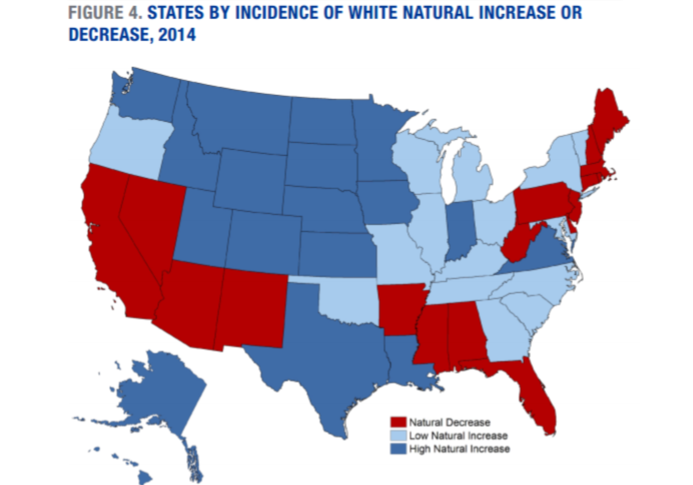
In 2014, for the first time, more white people died than were born in a record 17 U.S. states.
This is a significant increase compared to only four states with the same trend in 2004. These findings come from new research conducted by the Carsey School of Public Policy at the University of New Hampshire.
Around 121 million people, or 38% of the U.S. population, live in these states. They include California, Pennsylvania, Florida, Arizona, Massachusetts, New Jersey, New Hampshire, Mississippi, Arkansas, Delaware, Nevada, Maine, Alabama, Connecticut, New Mexico, West Virginia, and Rhode Island.
The study discovered that in an increasing number of states, deaths among non-Hispanic white people now outnumber births. This is because more white people are passing away, and fewer white babies are being born.
These changes are happening due to a few reasons. Firstly, there are more older white adults, who are more likely to pass away. Secondly, there are fewer white women of childbearing age, leading to fewer births. Lastly, the fertility rates among white women are decreasing.
These trends are hard to change, and it’s likely we’ll continue to see more deaths than births among white people in these states.
However, as the white population growth has slowed down, minority population growth has sped up. For instance, the Latino population is younger, with more women of childbearing age and higher birth rates. Therefore, Latino births far outnumber deaths.
These changes are leading to a more diverse America. According to projections from the U.S. Census Bureau, white people will represent less than half of the U.S. population (47%) by 2050. In contrast, the youthful Latino population is expected to make up 29% of the U.S. population by 2060.
The researchers warn that these shifts can have significant impacts on policies. The older white population will need more healthcare and retirement services, while the younger minority population will need more investment in education and training to prepare for future jobs. Balancing these needs might cause disagreements on where to allocate funds.
The study was led by Kenneth Johnson, a senior demographer at Carsey and a sociology professor at UNH, and Rogelio Sáenz, a policy fellow at Carsey and a professor at the University of Texas at San Antonio.
The Carsey School of Public Policy focuses on research and leadership development related to public policy, aiming to create innovative and fair solutions to today’s challenges.
Read the full report here.



